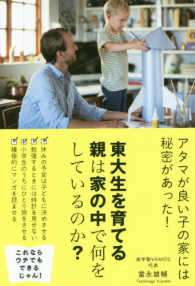Full Description
Challenges of work-life balance in the academy stem from policies and practices which remain from the time when higher education was populated mostly by married White male faculty. Those faculty were successful in their academic work because they depended upon the support of their wives to manage many of the not-work aspects of their lives. Imagine a tweedy middle-aged white man, coming home from the university to greet his wife and children and eat the dinner she's prepared for him, and then disappearing into his study for the rest of the evening with his pipe to write and think great thoughts. If that professor ever existed, he is now emeritus.
Juggling Flaming Chainsaws is the first book in a new series on these challenges of managing academic work and not-work. It uses the methodology of autoethnography to introduce the work-life issues faced by scholars in educational leadership. While the experiences of scholars in this volume are echoed across other fields in higher education, educational leadership is unique because of its emphasis on preparing people for leadership roles within higher education and for preK-12 schools. Authors include people at different places on their career and life course trajectory, people who are partnered and single, gay and straight, with children and without, caring for elders, and managing illness. They hail from different geographic areas of the nation, different ethnic backgrounds, and different types of institutions. What all have in common is commitment to engaging with this topic, to reflecting deeply upon their own experience, and to sharing that experience with the rest of us.
Contents
Foreword: The See-Saw of Work-Life Balance; Michelle D. Young.
Why Juggling Flaming Chainsaws in Educational Leadership? Joanne M. Marshall.
A Note on Methodology: Autoethnography and Other Reflections; George Theoharis.
Part I. Early Career Scholars.
Chapter 3. Working the Spirit: Narrating Work and Life; Noelle Witherspoon Arnold.
Chapter 4. The Journey to Fulfillment: Varied Paths, Same Destination; Lisa Bass.
Chapter 5. Finding Balance in a Tilted World; Karen Stansberry Beard.
Chapter 6. Reflections From the Brink of Tenure Application: Working Through Various Pathways; Bill Black.
Chapter 7. In and Out: Finding Work-Life Balance as a Queer Scholar; Christa Boske.
Chapter 8. myworklifebalance.edu; Melanie C. Brooks.
Chapter 9. The Good Mother: One Woman's Battle With the Hegemony of Work-Life Balance; Leslie Hazle Bussey.
Chapter 10. Fantasies and Strategies: A Graduate Student's Critical Examination of Work/Life Balance; Bradley Carpenter.
Chapter 11. Running Against the Clock: Staying Present on the Road to Tenure; Sarah Diem.
Chapter 12. Navigating the Terrain of the Three Selfs: Work-Self, Family-Self, Personal-Self; Kathrine J. Gutierrez.
Chapter 13. Working Without a Net: One Professor's Reflections on Work-Life Balance; Kristina A. Hesbol.
Chapter 14. Where Am I at Right Now, Anyway?! Blurred Boundaries of Home and Work Life; Muhammad Khalifa.
Chapter 15. One Family, Different Perspectives on Work-Life Balance; Lisa A. W. Kensler.
Chapter 16. Flying by the Seat of My Pants; Katherine Cumings Mansfield.
Chapter 17. Singing Along With the Lone Ranger; Joanne M. Marshall.
Chapter 18. From Condescending Cabbies to Caring Coaches: Basketball, Fatherhood, and the Shaping of Professional Feedback; Peter Miller.
Chapter 19. Work-Life Balance for Latina Faculty in a Hispanic-Serving Institution; Elizabeth T. Murakami.
Chapter 20. Pieces of a Professor: Living With Limitations, but High Expectations; Latish C. Reed.
Chapter 21. Creating Space; Martin Scanlan.
Chapter 22. A PhD Is a Family Affair; Douglas Wieczorek.
Part II. Midcareer Scholars.
Chapter 23. Working to Live and Living to Work: Finding Balance in the Academy; Floyd D. Beachum.
Chapter 24. How Can We Balance Work and Life? Kathryn Bell McKenzie.
Chapter 25. Be Kind, Be Critical, Be Productive: Nine Suggestions for Keeping Your Life and Work in Balance; Jeffrey S. Brooks.
Chapter 26. Achieving Work-Life Balance: Reflections of a Midlife Entrant to the Academy; Tricia Browne-Ferrigno.
Chapter 27. Seeking More Than Balance: An American Indian Female Scholar's Attempt to Navigate the Perceived Work-Life Divide; Susan C. Faircloth.
Chapter 28. Mommy Guilt and Chicken Coops: Work/Life Imbalance on the Tenure Track; Bonnie C. Fusarelli.
Chapter 29. Finding Courage and Choice on the Journey to a Balanced Life; Mark A. Gooden.
Chapter 30. Gen X in the Academy; Liz Hollingworth.
Chapter 31. Man, I Work Like a Woman; Eric A. Houck.
Chapter 32. Why Balance Isn't the Best Option: Changing Our Perspective to Work-Life Integration; Audrey J. Jaeger.
Chapter 33. Taking Control? Gaïtane Jean-Marie.
Chapter 34. A Perspective of Work-Life Balance in the Academy From a Single Male; Carlos R. McCray.
Chapter 35. Militello & Sons, Inc.: A Family Business; Matthew Militello and Dominic Militello.
Chapter 36. Navigating a Work-Life Balance in the Era of High-Stakes Accountability; Stacey A. Rutledge.
Part III. Senior Scholars.
Chapter 37. Thrown Out of Balance to Find True Balance ...; Kathleen M. Brown.
Chapter 38. Se Hace el Camino al Andar/We Make the Road by Walking: Ruminations on Work, Love, and Struggle in a Latino Academic Household; Gerardo R. López, Marina Nayar López, and Cora Lucía López.
Chapter 39. Not Even Built for Balance; Catherine A. Lugg.
Chapter 40. Role of Values in Work-Life Balance: Restoring Harmony and Reclaiming Purpose; Anthony H. Normore.
Chapter 41. Boomer Bred: Professional and Personal Reflections and Strategies to Survive in the Professoriate; Rosemary Papa.
Chapter 42. Don't Stop Believin' in the Importance of Work-Life Balance; Linda Skrla.
Chapter 43. Avis la Fin at the Downtown Grill and Brewery; Autumn K. Tooms.








